December 2023 Executive Summary for the Ninth Report of the Federal Monitor, Covering the Period from April 2023 through September 2023
Federal Monitor
Case 3:12-cv-02039-FAB Document 2541-1 Filed 12/14/23
This is the ninth Chief Monitor’s Report (CMR-9) outlining the compliance levels of the Commonwealth of Puerto Rico in relation to the Consent Decree entered between the United States and the Commonwealth of Puerto Rico. This report provides the ninth assessment following the four-year capacity building period established by the Consent Decree that ran from June 2014 to October 2018 and covers the period from April through September 2023.
During the CMR-9 reporting period, the Commonwealth’s achievements towards partial and/or substantial compliance with many of the paragraphs significantly improved. This improvement in compliance is largely due to the completion of the various tasks and initiatives related to several implementation plans including Use of Force (UOF), Professionalization, and Supervision and Management. The promotion of executive leadership as well as over 500 sergeants has improved the ratio of supervisors to officers across nearly all the areas. The Monitor’s Office expects that with these promotions and complementary updates to GO 310 (Performance Evaluations), issues in supervisory accountability will also be improved. Further, improvements to the tracking and recording of UOFs have also propelled the Bureau forward in its ability to provide accurate UOF data. These improvements will be further solidified once the new Records Management System (RMS) is in place. Other areas of progress included movements forward in procuring a new RMS and incremental improvements to stop and arrest reports, community engagement and the publication of crime data, the quality of domestic violence (DV) and sexual assault (SA) investigations, and the initiation of in-service training in related areas.
Further, as a result of the assistance provided by AH Datalytics, the Commonwealth’s contractor, the Reform Unit has made incremental improvements in its internal auditing and monitoring processes. These improvements have increased the unit’s ability to identify and address instances where internal reporting fails to meet the requirements of the Agreement.
Although overall largely promising progress has been made, the Monitor’s Office continues to note issues like poor documentation of probable cause and the use of boilerplate language in some arrest and stop reports, failures in supervision to issue corrective actions, and exceeding timelines in the adjudication of internal investigations and Commissioner’s Force Review Board (CFRB) evaluations of UOFs as in previous CMRs and noted again in this report.
The Monitor’s Office also stresses to the Commonwealth that in order for it to continue experiencing improvements to training, in particular in-service training, it must begin working towards developing the 2024 Annual Training Plan. Failure to do so, will again result in regressions in compliance with the conduct of in-service training and unit specific training, which span across all areas of the Agreement.
As noted in previous CMRs, adding to these issues are continued concerns over the lack of resources and staffing in several PRPB divisions and units, like the Auxiliary Superintendency for Education and Training (SAEA) and the Auxiliary Superintendency for Professional Responsibility (SARP), which further hamper the Bureau’s ability to move compliance forward.
As noted above, when examining the total paragraphs assessed in this report (N=177) in comparison to the previous report in which these sections and paragraphs were assessed (CMR-7; N=177), the Monitor’s Office notes that PRPB has achieved significant progress during this reporting period. For example, 101 paragraphs met partial compliance and 37 paragraphs were rated not compliant during this reporting period, in comparison to 77 paragraphs rated as partially compliant and 61 as not complaint in CMR-7. Further, when reviewed comprehensively, almost 77% (N=137) of the paragraphs meet either partial, substantial, or full compliance in CMR-9 in comparison to 59% (N=104) in CMR-7.
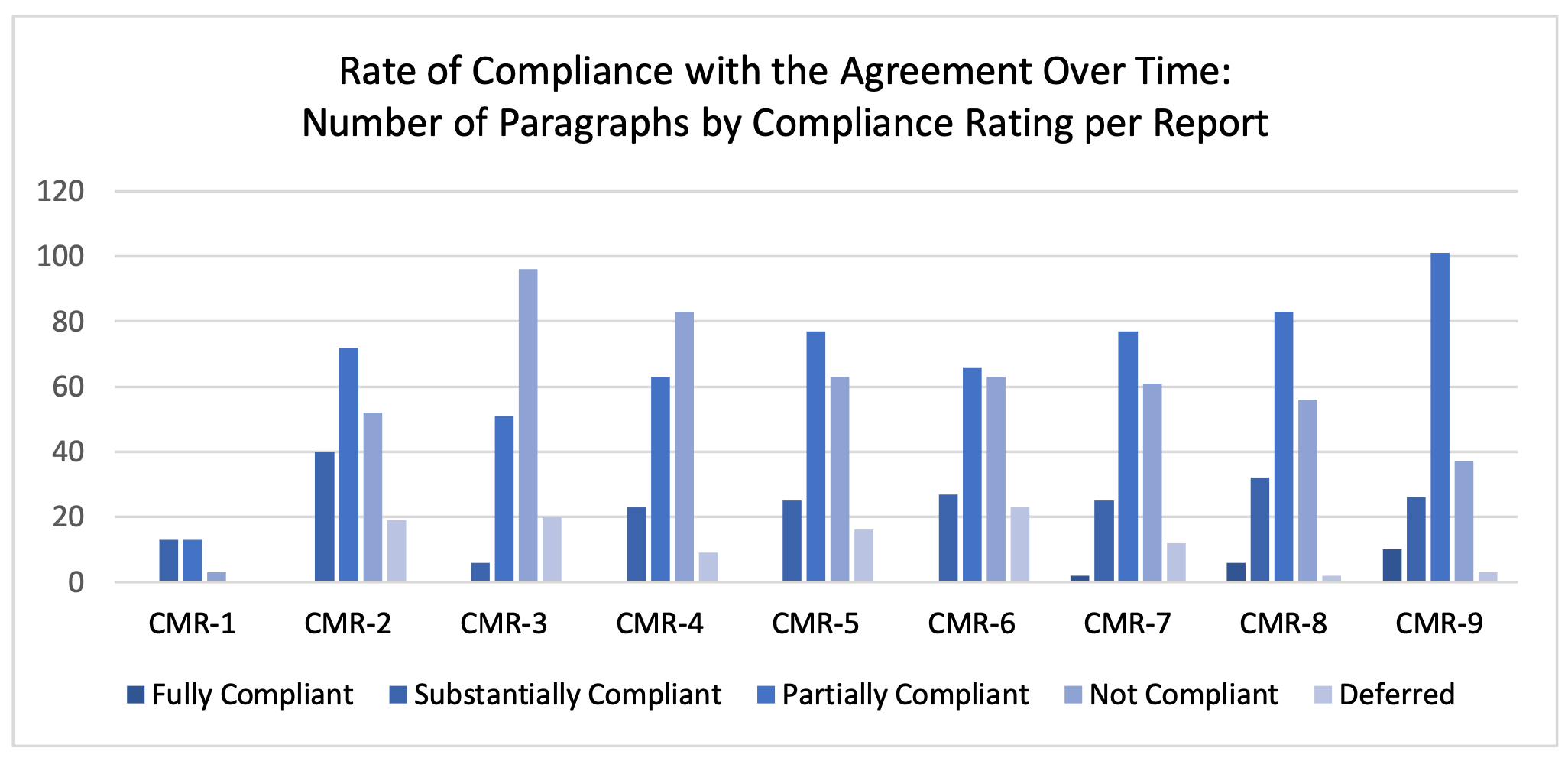
Monitoring Activities During CMR-9
Over the past six months the Monitor’s Office conducted five site visits to PRPB headquarters as well as various regions of the island including Aibonito, Mayaguez, Ponce, Humacao, and Arecibo. These field visits provided an opportunity for the Monitor’s Office to hear directly from supervisors and officers on the front line, speak with members of the Commonwealth community, observe operations, receive system demonstrations, and validate the assessments they made as part of their review of over 4,000 policies, documents, certifications, audio recordings, and case files and reports provided for review during the CMR-9 reporting period. The Monitor’s Office also reviewed 53 policies, forms (PPRs), and protocols under Paragraph 229 of the Agreement, observed various PRPB community engagement efforts, participated in 5 system demonstrations, and were present at several demonstrations and protests during the reporting period, including the May 1st demonstration.
In addition, during the CMR-9 reporting period, the Monitor’s Office participated in one status conference in June 2023. It focused on updates related to the CMR-8 report, sergeant promotions, Training Plan, IT Corrective Action Plan (CAP), the Supervision and Staffing Plan, Provisional UOF Plan, and the DV/SA Plan. Further, 90-day status updates to the Staffing and Promotion Plan and the final Training Plan as well as implementation plans for DV and SA and searches and seizures were submitted to the court by the Commonwealth during this reporting period.
During this reporting period, the Monitor’s Office also conducted a townhall meeting in September 2023. This meeting was attended by over 130 representatives from the community, the Puerto Rico Police Department (PRPB), and the Department of Public Safety (DSP). Similar community meetings hosted by the Monitor’s Office will be conducted quarterly.
Looking Forward to CMR-10
The Monitor’s Office is pleased with the Commonwealth’s progress as noted throughout the reporting period. It is hopeful that continued progress will be made in CMR-10 and future reports. Much of what remains to achieve partial and/or substantial compliance is going to be reliant on the Commonwealth’s continued work in implementing the various tasks and initiatives within its implementation plans and in carrying out the related training and sustaining its in-service training program. Additionally, the Commonwealth’s efforts towards restructuring its PRPB Reform Office and implementing auditing processes have demonstrated improvements in its ability to self-monitor. This will be heavily reliant on the Bureau’s improvements to its IT infrastructure, in particular the implementation of a new RMS, and its ability to capture accurate information and reports.
Despite these improvements, the Monitor’s Office continues to stress the importance of addressing the continual and lingering issues raised in several of its CMRs. Issues like extended timelines to complete its Force Review Board (FRB) evaluations, lengthy adjudication timelines for internal investigations, poor supervisory reviews of arrests and stop reports, and consistency in the quality of documentation of its DV and SA investigations are just a few of the issues noted in this and previous CMRs.
Staffing allocation in various units like Operational Audits, SARP internal investigations, Office of Legal Affairs (OAL), DV/SA units, etc. continue to hamper the Bureau’s ability to complete timely and/or comprehensive reviews and reports. Staffing allocation to improve caseloads must be addressed if the Commonwealth hopes to sustain the progress it has made thus far.
The Monitor’s Office will continue to review documents produced by PRPB and the Commonwealth in demonstration of compliance, conduct additional field visits, observe related training sessions, observe PRPB’s community engagement efforts, and conduct interviews with both PRPB personnel and community stakeholders. Further, during the CMR-10 reporting period, the Monitor’s Office hopes to continue to conduct additional Townhall Community Meetings across the island to share the Reform status and hear directly from the broader Puerto Rican Community.
Summary of Compliance by Section
The following summary provides an overview of the Monitor’s Office’s compliance assessment for each area of the Agreement.
1. Professionalization
With respect to Professionalization, the Monitor’s Office concludes that the Commonwealth has made progress towards compliance since the previous reporting period in which this area was assessed, CMR-7. The development of policies for promotions, staffing, career development, performance evaluations, and integrity audits have been completed or are in progress. Those policies that have been implemented and/or recently finalized incorporate the requirements of the paragraph(s). Further, although training in many of the areas of the Agreement had regressed during the CMR-7 reporting period, training on the Code of Ethics and Conduct is consistent with approved policies and has been delivered, as noted by the Monitor’s Office review of training records. While the Commonwealth has begun implementing many paragraphs of the Agreement in policy and training, the Bureau has not yet consistently demonstrated the application of these policies and training in practice with respect to Professionalization.
Two issues caused concern to the Monitor’s Office regarding Professionalization. First, the Monitor’s Office again notes the need to ensure that supervisors themselves are evaluated and promoted based on their work and the quality of the evaluations they perform of their supervisees. Second, during the recent round of promotions, a number of eligible officers were passed over for promotion due to open administrative complaints that in some cases were years behind schedule for resolution. This delay in attaining final resolution on internal investigations could significantly hold back careers and lifetime earnings. PRPB may be opening itself up to potential litigation for lost lifetime earnings from officers who are ultimately cleared of misconduct allegations but nevertheless missed a promotion opportunity due to these unresolved complaints. See the Civilian Complaints, Internal Investigations, and Discipline section for additional information.
During 2023, a total of 565 candidates were promoted to the rank of sergeant. The Monitor’s Office recognizes PRPB’s efforts in promoting good candidates for the rank of sergeant. Nonetheless, there were a total of 590 candidates that obtained passing grades in the same promotional exam, and a total of 26 candidates that were still “pending promotion” when the Monitor’s Office received the information of the promoted personnel. These discrepancies between the numbers of eligible personnel and the actual promotions should be reviewed and explained by PRPB. The Monitor’s Office recommends PRPB investigate the reasons behind these occurrences because, as mentioned above, there might be a cause for potential lawsuits.
As part of the Staffing Plan described in Paragraph 13, PRPB identified that 740 supervisors for 110 precincts were needed to assign at least six first-line supervisors to each precinct to meet the minimum supervisor-to-officer ratio of 1 to 8. As reported, after a total of 565 officers were promoted to sergeants during the first half of FY 2023, based on the needed number of supervisors identified by PRPB in their Staffing Plan, they still have a shortage of 175 supervisors. The Commonwealth also identified the need for 68 positions within the ranks of inspectors and colonels. During May 2023, 40 officers were promoted to inspector, 12 to commander, 12 to lieutenant colonel, and 4 to colonel for a total of 68, complying with the identified amount. PRPB is currently working on a captain promotion test with the goal of promoting the much-needed captains by August 2024. Also reported in the Staffing Plan was the re-assignment of personnel using the following breakdown: SAIC 20%, SAOE 10%, and Auxiliary Superintendency of Professional Responsibility (SARP) 5%, demonstrating compliance. A Project Manager was also identified to ensure compliance and the sustainability of initiatives. This position is a great strategy that will positively advance the entire reform as required.
As reported in the past, the Commonwealth has a board responsible for designing a promotion system, which includes the administration of examinations and other objective measures, complying with their goal. The Monitor’s Office remains confident that the Commonwealth will carry out the activities and timelines noted in the updated Staffing Plan as agreed which was filed with the Federal Court on September 5, 2023. The Monitor’s Office will continue to monitor the Commonwealth’s progress in future CMRs.
Overall, the Commonwealth’s compliance with the 10 paragraphs within Professionalization reflects substantial progress to what was noted in previous CMRs. In CMR-7 50% of paragraphs were found to be partially and substantially compliant and 50% were rated as deferred, where 100% of paragraphs were found to be partially and no paragraphs were rated deferred in the current reporting period. See figure 2.
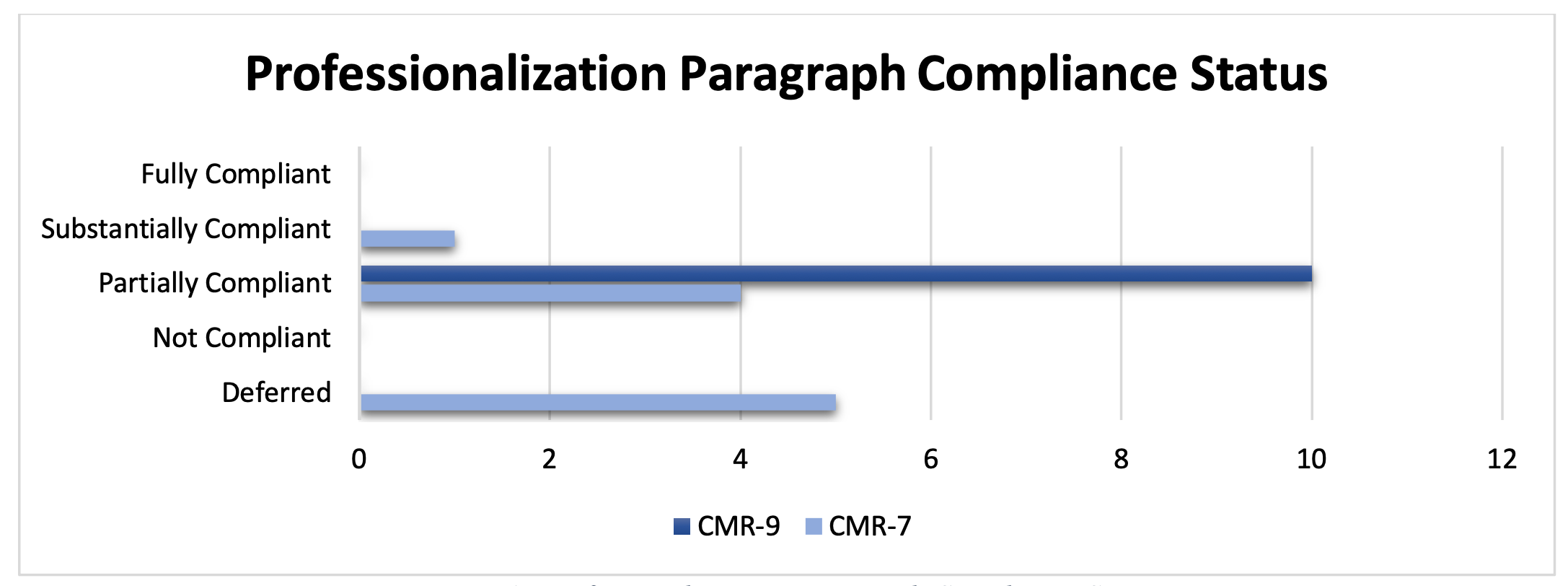
2. Use of Force
PRPB formally implemented its Provisional UOF Plan in July 2022. The Provisional UOF Plan increased supervisory layers of review to identify and correct errors and/or discrepancies in the UOF reporting forms in PRPB’s GTE system. As in the previous CMR, the Monitor’s Office has determined that the Provisional UOF Plan produces accurate numbers; however, PRPB was reminded that a more comprehensive, less labor-intensive system/plan needs to be developed.
As it relates to improving UOF reporting during this reporting period, PRPB has been able to demonstrate that it has continued to provide accurate UOF numbers. What has also aided PRPB in accomplishing this task was the Commonwealth’s contractor, AH Datalytics, which continues to develop and improve the UOF Dashboard that helps identify discrepancies in UOF reporting in the GTE system. This assistance provides the Reform Unit with the ability to comprehensively review whether certain procedural or documentary steps were taken as part of the force reporting process in the field. One issue that the Monitor’s Office was made aware of during its July 2023 site visit was that PRPB currently does not have the ability to migrate information in the GTE system to the UOF Platform. This is time-consuming and results in the duplication of work.
During this reporting period, PRPB reported 928 UOFs in 526 incidents. A cross check of various units’ data by the Monitor’s Office determined the accuracy of the data and that the information from PRPB’s GTE system is comprehensive. It should be noted that the Monitor’s Office, in reviewing whether PRPB officers are preparing and submitting UOF reports (PPR 605.1) in the timeframe as outlined in Bureau policy, has determined that PRPB has made significant progress. In the 84 UOF reports (PPR 605.1) reviewed by the Monitor’s Office all but one was prepared and submitted in the timeframe outlined in policy. In addition, as outlined in the policy, supervisors must complete their investigation within five business days. These are significant improvements that have resulted in improved compliance ratings. However, the Provisional UOF Plan is an interim plan while the Bureau develops a system that identifies discrepancies in real time and does not have to rely on various levels of review for identifying errors in the system and making the required corrections.
Consistencies in the UOF data largely affect many of the paragraphs in this section. Other topics such as the Force Investigation Unit (FIU), Force Review Boards (FRBs), Crisis Intervention Training (CIT), SWAT, and crowd control procedures also impact PRPB’s overall compliance with this section. As it relates to FIU, the Monitor’s Office continues to have some concern regarding the length of time FIU is taking to complete its investigations. However, during the latter part of CMR-8 there was a leadership change in FIU. The new commanding officer was able to secure additional personnel (investigators) resulting in the doubling of personnel in the unit. With the changes made in FIU, the Monitor’s Office observed significant improvement in investigation timelines as the Monitor’s Office observed more cases completed within policy (44%), but there are still a number of cases where the investigation was not completed within the 45-day requirement.
In the Monitor’s Office’s review of Commissioner Force Review Board (CFRB) evaluations, while the evaluations were objective, they also were not timely. It should be noted that during the month of July a member of the Monitor’s Office attended a CFRB meeting. The meeting was conducted professionally. During that visit the members of the Board shared with the Monitor’s Office that given the size of the file for each UOF case (hundreds of pages) it takes many hours to review, thus impacting the number of cases they can evaluate in the allotted time provided in policy and the Agreement.
Crisis Intervention Team (CIT), like UOF, has also been an area of discussion and focus for the Court in the past few months, including during the June 2023 Status Conference. Despite the completion of PRPB’s CIT pilot program in Arecibo (completed in November 2020), the Bureau has lagged in its efforts to expand CIT to all remaining area commands. However, during the reporting period PRPB made an effort to address this issue, 65 additional PRPB officers have been trained and certified as CIT officers bringing the number of CIT officers Bureau-wide to 83. With this influx of officers PRPB has been able to expand the CIT program beyond Arecibo to an additional five areas commands (Caguas, Bayamon, Carolina, Humacao, and San Juan).
Notwithstanding the issues noted above, the Commonwealth has demonstrated progress in many of the UOF paragraphs. Much of the efforts made in this reporting period can be attributed to PRPB’s continued collaboration with AH Datalytics, the Commonwealth’s contractor, who has helped PRPB develop several UOF related dashboards, which include “Compliance with Reports”, “Use of Force Statistics", “Requests from the Monitoring Team”, and “Specialized Tactical Unit Mobilizations.” These dashboards are useful to the Monitor’s Office as they serve as another tool in assessing PRPB’s compliance with the Agreement. The positive efforts made in this reporting period will, if continued, prove beneficial in subsequent reporting periods.
Overall, the Commonwealth’s compliance with the 36 paragraphs assessed during this reporting period within UOF reflects improvement in levels of compliance to what was noted in previous reports. In CMR-8, 58% of paragraphs (21 paragraphs) were assessed as partially compliant and 25% (9 paragraphs) were assessed as substantially compliant, in comparison to the current reporting period, where 61% of paragraphs (22 paragraphs) were found to be partially compliant and 31% (11 paragraphs) were found to be substantially compliant. Two paragraphs (6%) were rated as fully compliant, and one paragraph was rated as deferred (6%). See figure 3.
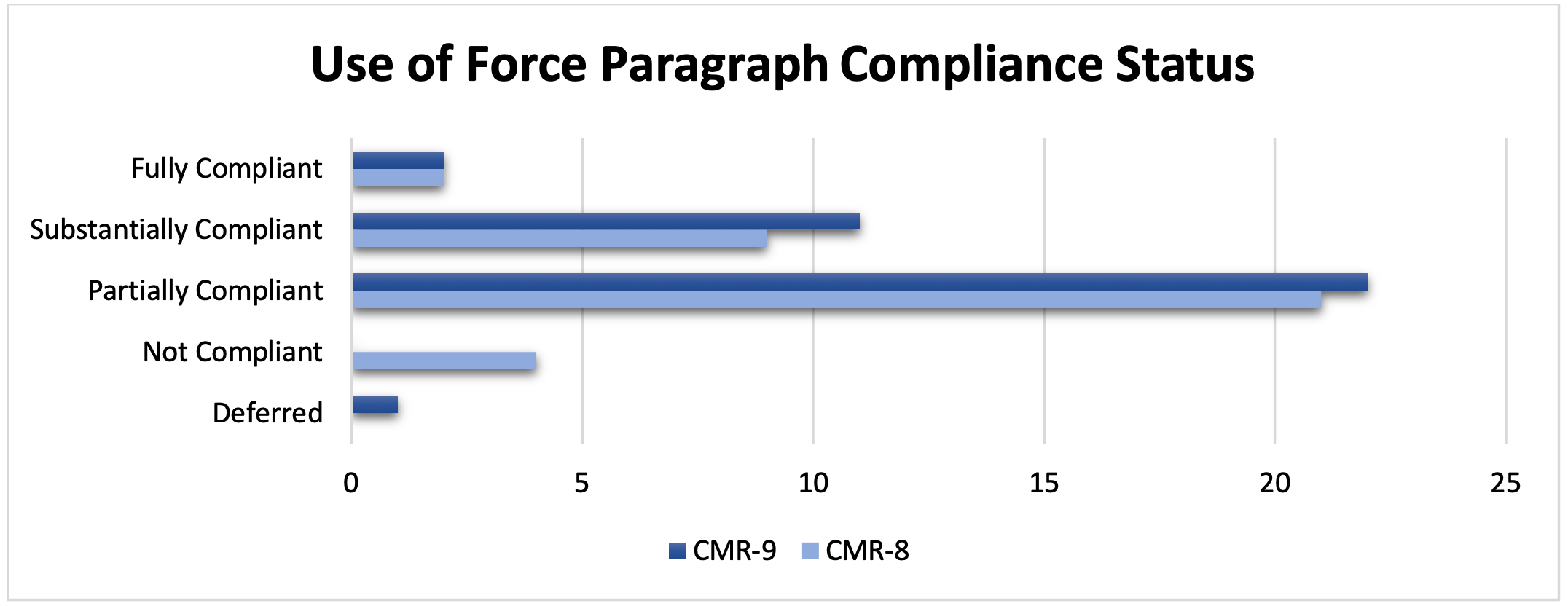
3. Searches and Seizures
Although the Monitor’s Office has noted some progress during this reporting period with PRPB officers clearly articulating probable cause in arrest reports, the number of poorly written reports and incomplete arrest files continues to be a concern. Many police reports do not particularly detail probable cause, as required for each arrest case, while other arrest files were rated not compliant for want of required forms. It is the Monitor’s contention that the lack of specificity in arrest cases leads officers to inevitably employ boilerplate, conclusive, and repetitive language in many cases. Also, there is no indication that supervisors and commanders are addressing these deficiencies or taking any type of corrective action.
On the other hand, PRPB supervisors are performing much better in the areas of arrest reviews, responding to scenes of arrests, and inspecting arrestees for injuries upon arrival at police facilities.
It is well established that PRPB does not allow its officers to conduct investigatory stops and searches, known as Terry Stops, other than stops resulting from traffic violations. However, traffic stops are recorded only when there is a citation issued or an arrest made. These traffic stops are not being tracked, collected, or reviewed by PRPB. The Agreement requires that ALL stops and searches be tracked, recorded, and reviewed.
Seized property/evidence forms are still missing from many arrest files, and officers, against the advice of the Monitor’s Office, continue to improperly ask arrestees to confirm they own potentially incriminating evidence seized from them by signing the evidence inventory form. This could potentially lead to a claim of 5th Amendment violations.
The Monitor’s Office inspected several property and evidence rooms throughout the island during this reporting period and found many to be improperly secured and lacked proper ventilation in some cases. The size of these rooms was inadequate in other cases.
Search warrant applications are being properly reviewed and approved by supervisors, and the resulting arrests are also being reviewed and evaluated by supervisors and commanders. There has been meaningful progress in the area of consent searches: all but one consent search case reviewed contained properly completed consent forms. However, a significant number of these searches ended in finding no incriminating evidence.
The Commonwealth, USDOJ, and the Monitor’s Office, continue to collaborate on a Search and Seizure Implementation Plan to address many of the issues raised here. PRPB has stated to the Monitor’s Office that the plan will be finalized and begin implementation by the end of 2023.
Overall, the Commonwealth’s compliance with the 22 paragraphs assessed during this reporting period within Searches and Seizures reflects the significantly improved levels of compliance to what was noted in previous CMRs. In CMR-7, 77% of paragraphs (17 paragraphs) were assessed as not compliant and 23% (5 paragraphs) were assessed as partially compliant, in comparison to the current reporting period, where 45% of paragraphs (10 paragraphs) were found to be not compliant and 50% of paragraphs (11 paragraphs) were found to be partially compliant. See figure 4.
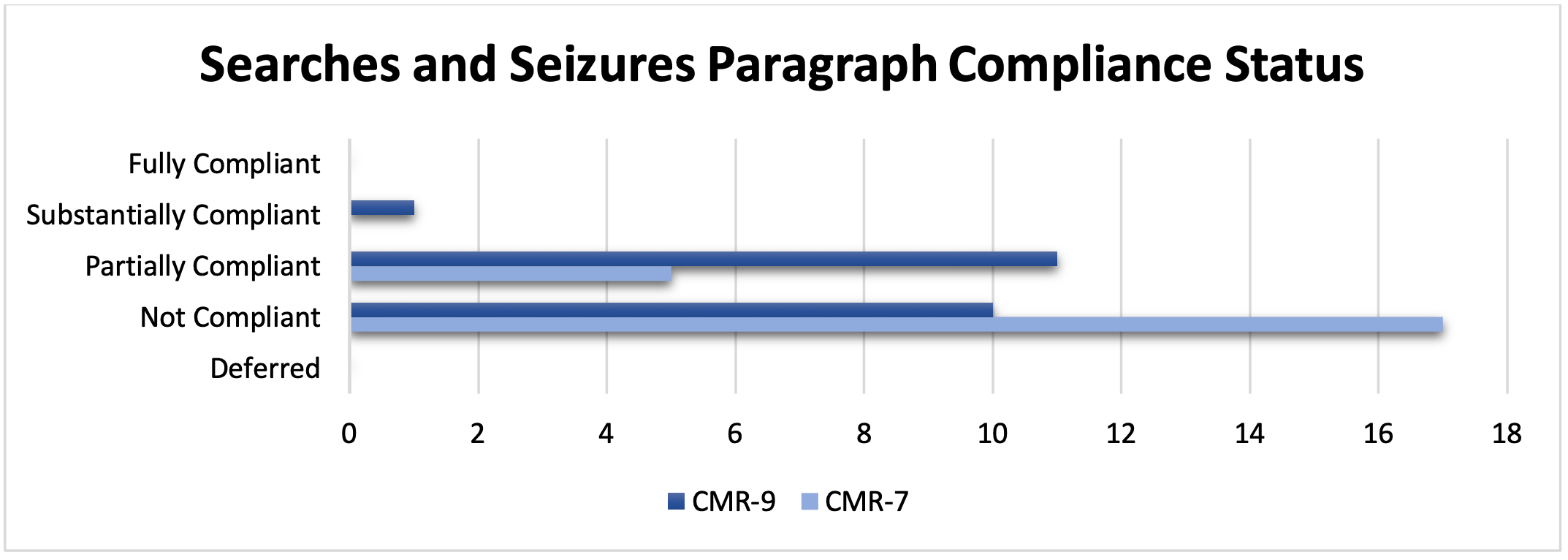
4. Equal Protection and Non-Discrimination
The review of the documents and data provided to the Monitor’s Office during this reporting period continued to demonstrate issues raised by the Monitor’s Office in previous CMRs. As noted in previous CMRs, much of PRPB’s progress in this area remains in partial or non-compliance. The paragraph compliance targets assessed in this reporting period primarily focus on PRPB’s efforts to demonstrate implementation of training and processes related to hiring, the civilian complaint system, performance evaluations, juvenile case management reporting, hate crime reporting, and bias-free policing training. There are no significant changes in PRPB’s progress in meeting the compliance targets assessed in this reporting period as compared to CMR-7. Nevertheless, it is worth highlighting that in September 2023 the court approved a comprehensive Sexual Assault and Domestic Violence (SA/DV) Plan that effectively addresses numerous issues previously identified by the Monitor’s Office. This plan, with identified timelines, serves as a catalyst for PRPB to proactively confront these critical concerns.
During the reporting period, the Monitor’s Office conducted a comprehensive review, provided feedback, and granted approval for various policies and procedures in connection with this section. These documents included GO 633 (Interventions with Minors), GO 310 (Performance Evaluations), GO 645 (Elderly Incident Investigations), GO 630 (Identification and Investigation of Hate Crimes and/or Incidents), the Manual on Hate Crime Identification and Investigations, GO 644 (Domestic Violence Incident Investigations of Employees), GO 627 (Domestic Violence Investigations), GO 616 (Documentation of Vehicular and Pedestrian Stops), GO 635 (Abuse or Neglect in Juvenile Institutions), GO 607 (Incidents of Sexual Crimes Committed by Employees), GO 622 (Investigations of Incidents of Sexual Crimes and Child Abuse), GO 118 (Domestic Violence Division), GO 624 (Interaction with Transgender and Transsexual People), and GO 626 (Intervention with Foreign Persons).
A significant portion of the Monitor's suggested revisions to the policies assessed during the reporting period centered on the establishment of clear timelines for updates on investigations. Additionally, the Monitor’s Office recommended that PRPB members ensure the provision of support services information to SA and DV victims. To enhance the DV policy, the Monitor’s Office advised including a trauma-informed investigation method statement and the integration of The Coordination of Protection Order Program (COPOP) procedures into the policy. These updates would subsequently be incorporated into the relevant training courses.
Furthermore, upon reviewing the documents and data submitted to the Monitor's Office during this reporting period, persistent issues previously highlighted by the Monitor’s Office in prior CMRs became evident. An examination of non-PRPB officer involved cases was reviewed- 91 DV investigations and 70 SA investigations revealed several shortcomings:
- PRPB fails to adequately document the use of a trauma-informed response method.
- Consistent provision of available resources and safety information to domestic violence victims is lacking.
- Timely follow-up with victims is not consistently achieved by PRPB.
The Monitor’s Office underscores that implementing changes such as refining the way police reports are drafted, using an investigative checklist, holding supervisors accountable, and enhancing training protocols will be instrumental in enhancing PRPB's compliance with the relevant paragraphs and addressing these recurring concerns.
Incidents and events that have transpired during this reporting period have once again placed a spotlight on SA and DV cases involving PRPB members. Upon examining these investigations, PRPB does adhere to its established policy regarding the confiscation of officers' weapons and their referral to an employee assistance program when a PRPB member is implicated. The Monitor’s Office continues to emphasize the critical need for PRPB to consistently apply its policies when investigating cases involving PRPB members. It is also recommended that PRPB take proactive steps to support its officers in coping with the stressors inherent to their job.
Additionally, the Monitor’s Office underscores the importance of transparency and accountability for all parties involved. To achieve this, it is essential that cases are thoroughly and promptly investigated and processed. A comprehensive response plan is strongly recommended for PRPB to address the way it handles cases involving PRPB members, ensuring a more effective and accountable approach.
On March 6, 2023, a meeting was convened between the Parties to discuss the formulation of an implementation plan centered on ensuring PRPB's compliance with the sexual assault and domestic violence provisions stipulated in the Agreement. This plan specifically targets Paragraphs 80 to 82, 84 to 86, and 93 to 99, focusing on their relevance to the administrative investigations of SA or DV allegations involving PRPB personnel. The overarching objective of this plan is to address and rectify many of the issues that have been identified by the Monitor's Office, ultimately leading to enhanced compliance.
The plan will encompass a range of critical areas, including training, the quality of investigation files, the adoption of victim-centered practices, improved supervision, refining internal investigation procedures, and addressing staffing and resource-related concerns. An initial draft outline of this implementation plan was presented to the Parties in March 2023. The SA/DV Plan was formally submitted to the court and approved on September 5, 2023. The Monitor's Office anticipates the commencement of the plan's implementation stages in the early part of CMR-10 This forward progress marks a significant step toward ensuring PRPB's adherence to the Agreement's provisions regarding sexual assault and domestic violence cases.
In summary, the Commonwealth's compliance with the Equal Protection and Non-Discrimination paragraphs reveals progress compared to what was previously observed in prior CMRs. In CMR-7 52% (11 paragraphs) of paragraphs assessed were partially compliant and 10% (2 paragraphs) of paragraphs assessed were substantially compliant, in comparison to the current reporting period, where 48% of paragraphs (10 paragraphs) were found to be partially compliant and 19% (4 paragraphs) of paragraphs assessed were substantially compliant. See figure 5.
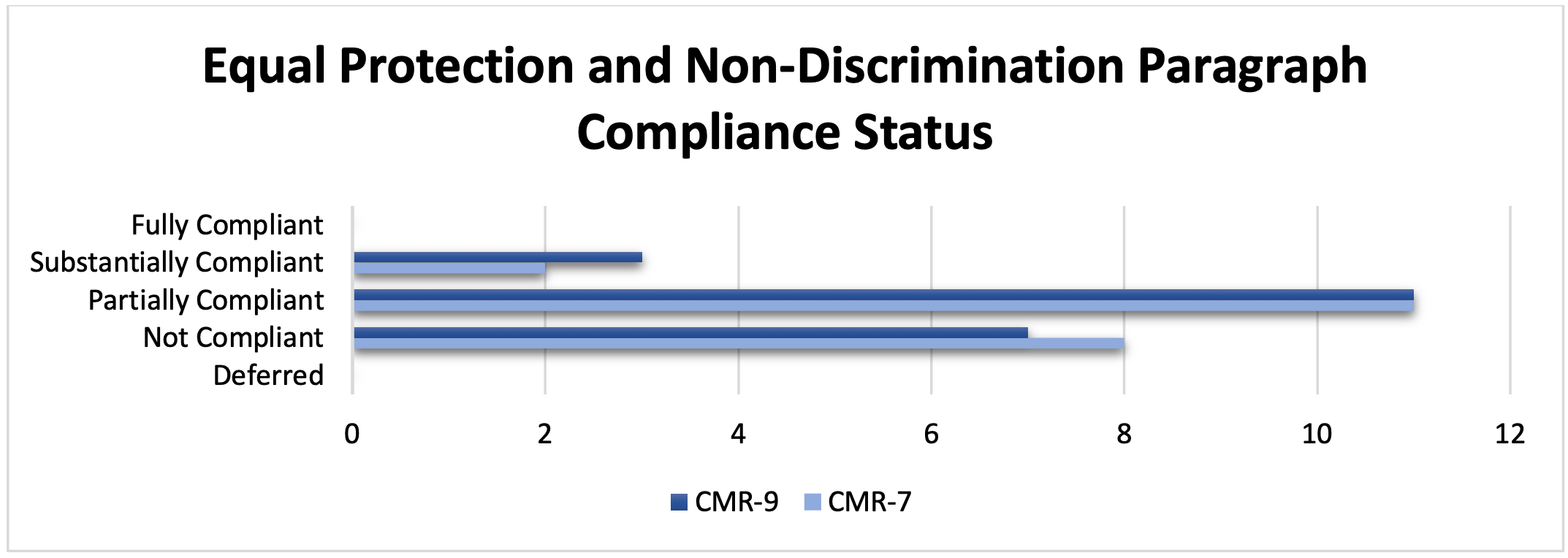
5. Policies and Procedures
For the twelve-month period covering CMR-8 and CMR-9 (October 1, 2022 through September 30, 2023) the Monitor’s Office reviewed and, in some cases, approved 119 policies, manuals, regulations, and guides under Paragraph 229. Forty-two of those documents were signed and approved by the Police Commissioner and published in PRPB’s Virtual Library, while 18 remained unpublished. As noted by the Monitor’s Office in previous CMRs, PRPB policies routinely direct its personnel of the need to abide by the Bureau’s rules and regulations, as well as Commonwealth laws and constitutional guarantees. Personnel are also instructed to report any policy violations they observe or are aware of; the policies also detail the consequences for failure to abide by the policies and/or failure to report violations by others. PRPB provides new and revised policies to its personnel through a web-based Virtual Library system, which is also available to the general public through its website.
The Monitor’s Office often accesses the Virtual Library for its own work and continues to find it to be easily accessible and searchable by subject, title, or keyword. However, the Monitor’s Office has observed that often updated or new policies and procedures are not published in a timely manner, as required by the Agreement.
PRPB has stated to the Monitor’s Office that, in addition to the Virtual Library, PRPB personnel learn of new and revised policies and procedures via Policia Informa, Outlook emails, and through monthly trainings held at each Police Area. Roll calls held before each shift are also methods of instruction used throughout the agency. Although PRPB does not yet have the technology in place to be able to verify or confirm that officers open and read the policies sent via Policia Informa and Outlook, it has stated that it is working on developing an electronic system to accomplish this goal. In interviews with the PRPB Policy Development director, the Monitor’s Office was informed that PRPB looked into purchasing an off the shelf system to maintain and track policies, but decided against it as it was cost prohibitive. Instead, they are planning to develop an in-house system and will present it to the Monitor’s Office for review when developed.
As noted in previous CMRs, training on and the implementation of a number of policies continues to be behind schedule. An example of this is GO 310 – Performance Evaluations. This policy was approved and signed by the Commissioner in February 2023, but training has not yet been developed, despite the expectation that the new evaluation process will be implemented in January 2024. However, PRPB has informed the Monitor’s Office that it is developing its own virtual training system, and they are hoping to be on track with training by the next reporting period.
Overall, the Commonwealth’s compliance with the eight paragraphs within Policies and Procedures reflects similar progress to what was noted in previous CMRs. In CMR-7, 75% of paragraphs (6 paragraphs) were assessed as partially compliant and 25% of paragraphs (2 paragraphs) were assessed as substantially compliant. This holds true for the CMR-9 reporting period. See figure 6.
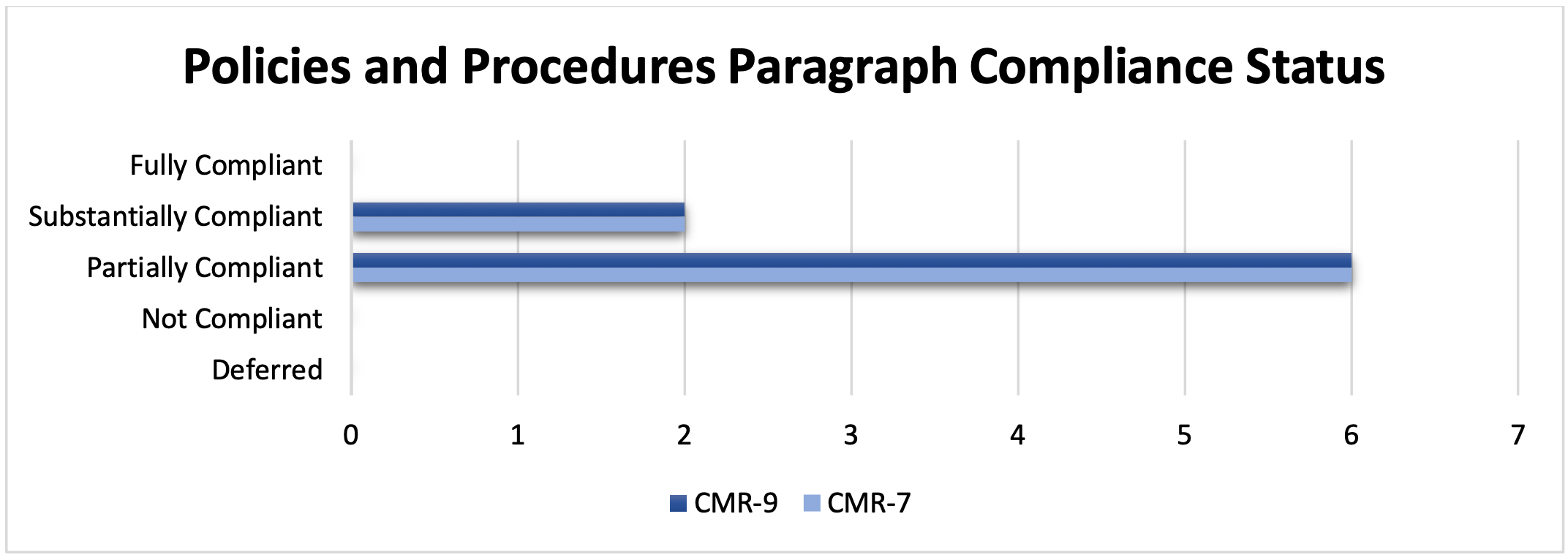
6. Supervision and Management
During this reporting period, the Commonwealth continued to struggle with achieving compliance with this section of the Agreement. Although the Commonwealth promoted over 500 sergeants during this and previous reporting periods and was able to secure the 8 to 1 ratio in nearly all precincts and districts, lack of follow through in supervisory accountability, and a failure to develop and institutionalize adequate information technology systems to support supervision (i.e., Early Intervention System, EIS) continue to hinder PRPB’s progress towards substantial compliance.
In addition to the sergeant promotions, in May 2023,40 officers were promoted to inspectors, 12 to commanders, 12 to lieutenant commanders and 4 to colonels for a total of 68 promotions, meeting the identified amount noted in the Staffing Plan. PRPB is currently working on a captain, 1st lieutenant, and 2nd lieutenant promotion test with the goal of promoting the much-needed ranks by August 2024.
The development of EIS continues to be dependent on the implementation of the IT Corrective Action Plan (CAP). Inspections and audits also continue to be a concerning issue due to lengthy inspection completion and certification times. It was reported that the Commonwealth is still working with the OSM to draft policies and protocols related to Integrity Audits.
During officer and supervisor interviews, concerns were raised regarding the transfer unit, assignments, evaluations, and shortages of vehicles and low budgets for vehicle repairs. Several meetings with the personnel responsible for Staffing Plan updates, human resources personnel, and high-ranking officials, confirmed that they were aware of these concerns and noted that they are currently working towards solutions. PRPB needs to provide the proper updated supporting documentation showing progress towards these solutions to the Monitor’s Office. Another issue identified during the interviews was the lack of roll call meetings. The main reason given was the lack of supervisors and personnel. It is the hope that with the increase in supervisory personnel, PRPB can re-establish these training meetings and roll calls.
PRPB has also yet to provide training on the new evaluation policy, which is scheduled to take effect in January 2024. This training should direct supervisors how to determine fair and effective scores and, more importantly, how to write the summaries supporting the scores. This training is imperative to the success of the new policy. Providing the proper training to the recently promoted 565 sergeants and 68 high ranking officials should alleviate the evaluation crisis.
Overall, the Commonwealth’s compliance with the 19 Supervision and Management paragraphs assessed during this reporting period reflects improved levels of compliance to what was noted in previous CMRs. In CMR-7, 16% of the 19 paragraphs (3 paragraphs) were assessed as partially compliant and 5% of the 19 paragraphs (1 paragraph) were assessed as substantially compliant, in comparison to the current reporting period, where 42% of the 19 paragraphs (8 paragraphs) were found to be partially compliant and 5% of the 19 paragraphs (1 paragraph) were assessed as substantially compliant. See figure 7.
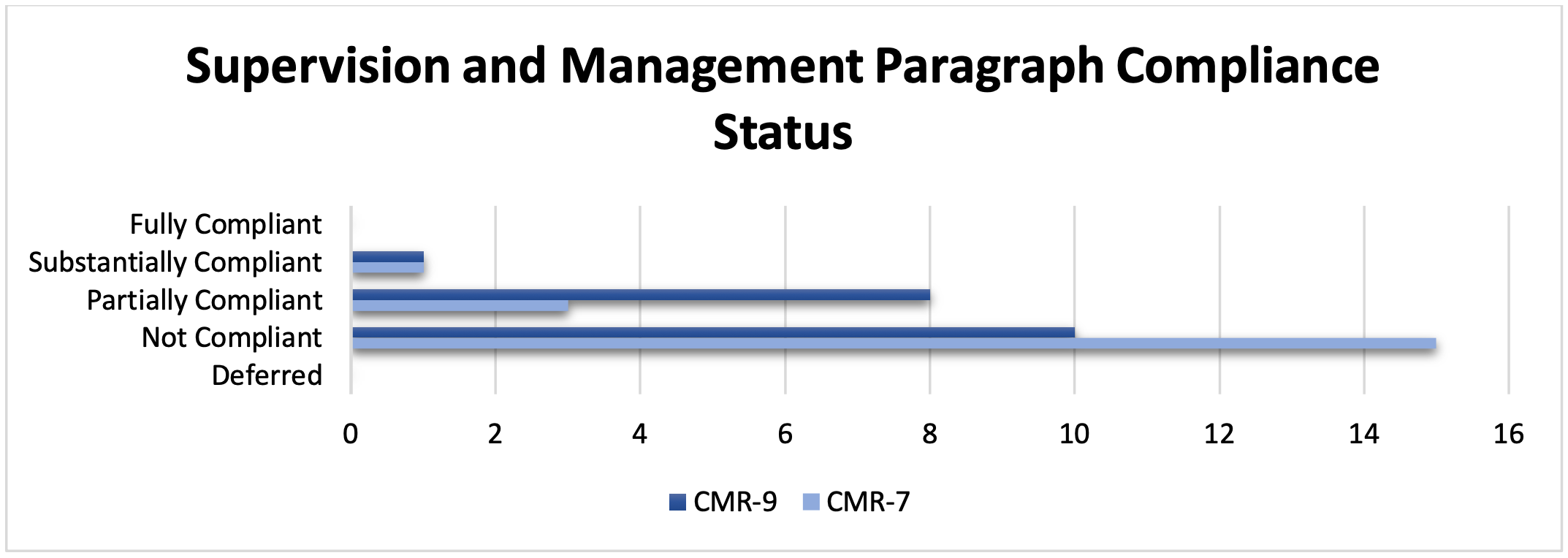
7. Civilian Complaints, Internal Investigations, and Discipline
Under its own rules, which were approved by the Court and supervised by the Monitor, OAL has a 30-day limit for analysis, recommendation, and determination, of administrative complaints that must be notified both to the complainant and accused. The Monitor continues to observe multiple cases that continue to take months and some over three years.
After nearly two years of highlighting the impact of shortages in staff in OAL, the Commonwealth’s only response to this issue was to add one lawyer to OAL.
As it relates to the investigatory process, the Monitor’s Office finds that most internal investigations were conducted well and were eventually adjudicated in accordance with facts uncovered by the investigator. Nevertheless, improvements must be made to achieve the overall goal of substantial compliance.
Training continues to be an area of poor performance for the entire organization in general, and SARP is no exception. While the Monitor Team is well aware of lingering training delay issues brought about by COVID-19, we take this opportunity to urge the SARP/SAEA partnership to begin working on the annual SARP re-training. The vast majority of SARP personnel deployed to the field will likely be unfamiliar with very recent and substantial changes in policy, investigative methodology, protocol, and practice. Due to these changes, the Monitor recommends a minimum of two full days of “in-service” training for each SARP member for this first iteration of SARP in-service training. This extended class time will be needed to address the large volume of changes made by the PRPB concerning SARP. Furthermore, this training must be presential and incorporate practical and participative pedagogy. In the future, annual re-trainers to address changes in SARP methodology, rules, and procedures, could possibly be delivered remotely via eLearning, if feasible and if the subject matter lends itself to virtual learning. At a minimum, the Monitor’s Office expects to see a plan to address the current need for SARP in-service training during the CMR-10 reporting period to extend into 2024. The Monitor strongly recommends that this plan be completed and shared with the Monitor’s Office prior to the end of calendar year 2023.
The Monitor is pleased to report that the once-dire circumstances of the FIU, especially regarding its human resource component, have in large part been remedied. While this is indeed good news, the lack of human resources across SARP entities other than FIU continues to concern the Monitor.
As part of the accepted methodology, the Monitor has endeavored to privately interview every single active SARP investigator and has nearly reached that goal. As of this date, the Monitor has interviewed over 150 current and former SARP investigators. The majority of active SARP investigators have expressed concerns over case workload and a deficiency in human resources needed to effectively manage their given caseloads. The impact of the problem ranges from minor to severe, depending upon the delegation. The Monitor discovered that in some offices, it is not uncommon for one investigator to have over one dozen cases open at any given time. Some of these cases may have been reported in other delegations, meaning that the investigator or witnesses must travel across jurisdictions to be interviewed.
In each of these 12 open cases, the clock is ticking down to its 90-day limit and additional cases are assigned as they come in. It is important to understand that under SARP rules, ‘case overload’ is unacceptable as an excuse to grant any extension. Unrealistic expectations such as these make the job of a SARP investigator more about juggling precious and limited investigative time rather than about the overall quality of an investigation. The Monitor’s Office encourages SARP Command to meet regularly with its field investigators and supervisors – not just its Area Commanders - in listening sessions, in much the same way as the Monitor’s Office has, to gain insight into their needs for resources, both human and otherwise. Better oversight of caseload and human resources at the level of each Area command is paramount, as is PRPB’s response to these needs.
As predicted in previous CMRs, the Monitor’s Office has been informed of at least one a cause of action filed against the PRPB resulting from a recent promotional candidate being passed over for promotion. The Monitor is well aware of various members of the PRPB who were denied promotion in rank due to the existence of a SARP complaint against them. Some of these cases have awaited adjudication for years.
The Monitor’s Office’s concern does not end here. Not one Internal Affairs office has been relocated away from police facilities despite the Monitor’s Office’s longstanding finding that this practice must end without further delay. The Monitor’s Office takes notice that SARP has been earnest in its ongoing efforts to identify suitable locations for Internal Affairs Bureau (NAI) delegations in settings not associated in any way with law enforcement. Site identification, however, is only the first step in the process and must be followed up by contracting and procurement.
Overall, the Commonwealth’s compliance with the 46 paragraphs assessed during this reporting period within Civilian Complaints, Internal Investigations, and Discipline reflects a progression in compliance to what was noted in previous reports. In CMR-8, 46% of paragraphs (21 paragraphs) were assessed as partially compliant and 26% (12 paragraphs) were assessed as substantially compliant, in comparison to the current reporting period, where 52% of paragraphs (24 paragraphs) were found to be partially compliant and 15% (7 paragraphs) were found to be substantially compliant (4 paragraphs moved to fully compliant). Two paragraphs (4%) were noted as deferred in CMR-9. See figure 8.
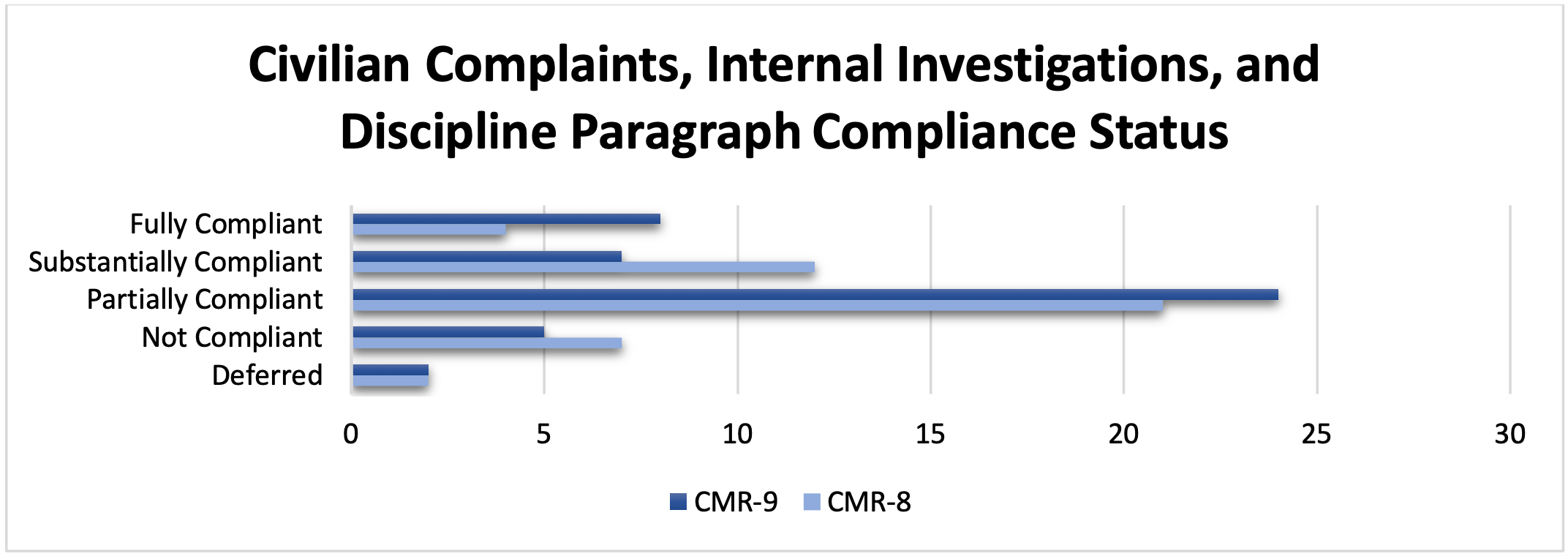
8. Community Engagement and Public Information
Of the 13 paragraphs within Community Engagement and Public Information, a limited number are assessed every six months. A comprehensive review of this entire section was provided in CMR-8 and will be provided again in CMR-10. For CMR-9, only 9 paragraphs (Paragraphs 205 - 207, 211 - 212, and 214 - 217) are assessed in this report and, in most instances, only specific targets within these paragraphs are assessed biannually. The compliance targets assessed in this reporting period are bolded in the paragraphs identified above.
The paragraphs assessed during this reporting period center primarily on PRPB’s efforts to establish and demonstrate effective practices in the implementation of community policing. Such practices encompass 1) the recruitment of a diverse and representative workforce; 2) performance appraisals; 3) personnel deployments in response to community engagement efforts; 4) collaborative problem-solving activities through the implementation of the SARA Model; 5) meaningful outreach activities purposely focused on education, prevention, and awareness; and 6) improving the community’s quality of life through strategic and structured planning for vested community interactions. Public Information requires keeping the public informed about new policies, police practices, and the dissemination of accurate and updated monthly crime statistics, including hate crimes, gender and domestic violence, and child abuse. Public information thus facilitates direct communication channels for transparency and accountability in the Bureau’s exchanges.
Partial progress has been achieved in community engagement and public information during this reporting period. However, these strides are at the administrative level which are currently in the developmental stages for continued implementation. Those changes must be progressively demonstrated through structured strategies, organized initiatives, work plans, established timelines, and evidence for compliance assessment moving forward.
During this reporting period, the Monitor’s Office re-reviewed GO 127 (Multimedia), and interviewed PRPB members directly involved in community policing and outreach at various levels within the districts, precincts, and area commands. Interviewees spanned 8 police areas, 4 specialized units, and members of the Community Interaction Committee (CIC), who represent the community within all 13 police areas. Additionally, the Monitor’s Office attended a Conversatorio, a community meeting held in Guayanilla hosted by the Ponce CIC and a Central CIC meeting held in Aguadilla. Finally, the Monitor’s Office observed a validation exercise at the executive level as part of a training session on community policing for PRPB facilitated by the Reform Office.
The Monitor’s Office also held a community meeting in Hato Rey where community stakeholders within the Metro area had the opportunity to share concerns from their representative perspectives and voiced the need for PRPB to become directly involved to improve the community’s quality of life and actively engage in problem solving initiatives through articulated and structured plans. Additionally, the Monitor’s Office held a Townhall meeting in Ponce through joint efforts with PRPB. Approximately 130 community members and stakeholders including Community Safety Councils (CSCs), representatives from various municipalities, and CIC representatives attended this meeting. The Honorable Francisco A. Besosa, US District Judge for the District of Puerto Rico, addressed the group along with guest speakers Alexis Torres, DSP Director; PRPB Commissioner Antonio Lopez, and USDOJ representative Luis Saucedo, Esq.
Progress towards substantial compliance is hampered by lapses in training in community policing through SAEA. Progress requires greater commitment to capacity building for a comprehensive approach in community policing, including best practices in the implementation of the SARA Model for problem solving, community outreach through public education, awareness, and prevention, and the development and sustainment of meaningful community alliances.
On the positive side, the Monitor’s Office saw significant improvement in securing CIC members in each police area during this reporting period. The CICs are instrumental in providing recommendations to PRPB on policies, recruitment, and implemented strategies based on the perspectives, experiences, and needs of their representative communities. However, PRPB continues to struggle to deliver all training required to confirm these members. Training CIC members to perform their required duties remains a longstanding and unresolved issue for PRPB. Moreover, PRPB must expand its joint efforts with the community to develop and deliver a comprehensive community policing approach that collaboratively identifies and implements evidence-based strategies to address crime and safety issues within each of the 13 area commands and the CICs. CICs input must be sought in all functions established by policy, including policing practices, victim services, community feedback and training, compliance with the Agreement, and disseminating information to the public with added transparency.
Key areas of non-compliance with community outreach practices, as outlined in the Agreement, include 1) reaching out to the community and delivering information to the public through open meetings (Encuentros Comunitarios) to address issues of community concerns, 2) reporting on Agreement progress, and 3) educating the public on topics outlined by the Agreement, including crime statistics, UOF, nondiscriminatory practices, administrative complaints and commendations, individuals’ rights to decline consent to voluntary searches, among other topics. The Bureau’s struggles to deliver these meetings remain unchanged from previous CMRs. The Agreement and PRPB policy require holding these meetings at least once per year in each of the 13 police areas. However, evidence reviewed revealed that only one police area held its open meeting, and even in that case documentation in support of the activity was incomplete. Four other police areas submited documentation for assessment; however, they did not meet compliance targets, as the activities submited as evidence were documentation of “Conversatorios,” which are initiatives carried out by the CICs.
Community dashboards were made available to the public on May 18, 2023, allowing the public to obtain criminal statistics through public reports. This is a significant milestone reached by the Bureau in efforts to facilitate public information in a more transparent and public-friendly format, to the extent allowable by law. However, the dashboards currently do not suffice to render a substantially compliant rating. The reports do not contain statistics on hate crimes, gender violence, including violence against transgender individuals, or child abuse. PRPB also redesigned its website by incorporating a sign language interpreter to the Commissioner’s message on the website and will employ closed captioning through its multi-media resources to help keep the deaf community informed, in the absence of a sign language interpreter for added sensitivity towards diversity and inclusion within the community.
These gains notwithstanding, PRPB’s efforts to reach out to and educate the public remain insufficient to date. PRPB must maximize use of internal resources, including multimedia tools and the Press Office, to educate the public and convey awareness to the community about participation in community policing. The public should be aware of opportunities to participate in focus groups, provide input on strategies to fight crime, inform crime trends, review policies and practices, communicate the Bureau’s progress on the Reform, and address issues in domestic and gender violence and non-discriminatory practices, among other topics. Expanded and targeted efforts should include the development of informational campaigns through videos and podcasts for dissemination.
Overall, the Commonwealth’s compliance with the nine Community Engagement and Public Information paragraphs assessed during this reporting period, reflect similar levels of compliance noted during previous reporting periods. In CMR-7, the last CMR in which all this subset of paragraphs, were reviewed, 44% of the paragraphs (4 paragraphs) were assessed as partially compliant, in comparison to the current reporting period, where 67% (6 paragraphs) were found to be partially compliant. See figure 9.
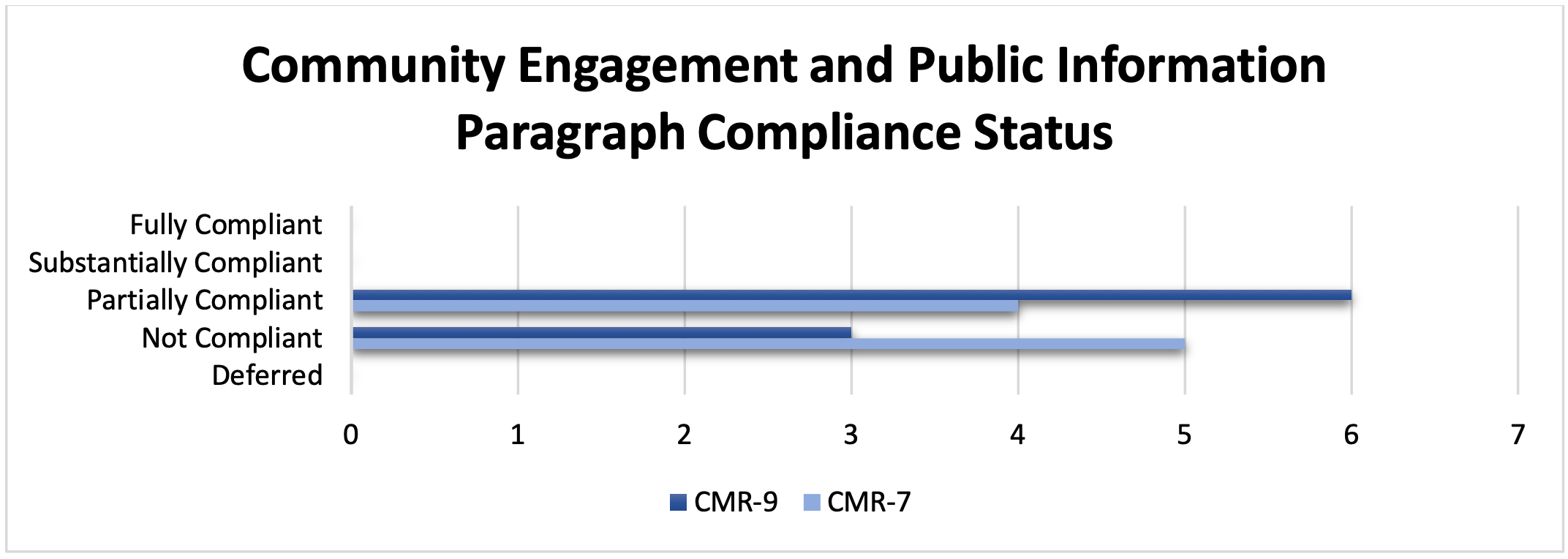
9. Information Systems and Technology
The Commonwealth’s compliance with the six Information Systems and Technology paragraphs has moved toward the positive from what was reported in CMR-8 when 33% of systems were found to be partially compliant. As of this report writing, separate from operational and procedural compliance, Paragraphs 218 - 221 are considered partially compliant for technology. This status indicates a level of compliance that is headed in the right direction, but it should not be mistaken as satisfaction of the October 2019 Compliance Targets. In that respect, 7 of 18 systems (39%) remain not compliant or deferred. See table 3 below. Long term sustainability of PRPB’s managerial compliance efforts remains to be proven.
The Commonwealth has been helpful in moving forward to address the IT CAP following the involvement of the Monitor’s Office and the Commonwealth’s contractor, Gartner Inc. To do so the Monitor’s Office allocated staff to lead the drafting of the contract documents and their contents. Further, AH Datalytics, the Commonwealth’s contractor, consistently provided the only substantial subject matter experts capable of collecting data and developing digital dashboards. PRPB, USDOJ, and the Monitor’s Office are all pleased with the progress being made, but a reconciliation of data analyzed versus an actual inventory of data on hand is required to assess the veracity and quality of data captured and qualified by AH Dataytics, the Commonwealth’s contractor.
Operational obstacles to achieving consistent, repeatable use of systems remains elusive. For example, during the July site visit to Ponce, it was noted that staff were capably recording SA data in GTE but could not seamlessly search the data once loaded. Further, data was also tracked manually in spreadsheets potentially disassociating edits from what was captured in GTE. Doing so is not a “best practice”. And although the manually tracked contextual data was more granular and descriptive in the SA module, the data was not shareable with GTE. Therefore, the Commonwealth should establish a project to review the accuracy of the data collected (see the observations below for additional detail.).
Generally speaking, during the reporting period, the following observations and areas of concern were noted:
Observations
- Contrary to the status provided during CMR-8, further demonstration of SA and DV Modules indicates that they are still in development and the data is not reliable. This could drop the compliance rating from substantial to partial.
- Contracting with Gartner Inc. was a laborious endeavor that would not have been completed without the contracting support provided by the Monitor’s Office.
- Exhaustive inputs were needed from the Monitor’s Office, USDOJ, and Gartner Inc., the Commonwealth’s contractor, WRT to the eventual contracting documents and artifacts needed to contract with Gartner Inc.
- After working with the Commonwealth on workshops for the RMS procurement and establishment of the PMO, Gartner Inc., the Commonwealth’s contractor, experts have expressed concern regarding PRPB ‘s lackluster responsiveness to tasking and scheduling as well as their lack of urgency regarding the pace of the activity required. This could add a minimum of two weeks to these projects.
- Ponce noted that after incident reports are tallied and reported to headquarters that they receive them back to insert SA and DV data because the data cannot be properly captured initially in CAD/GTE. This is similar to the inadequacy of the UOF data originally collected.
Areas of Concern
- Although noted in multiple instances, PRPB has not engaged in serious dialog regarding cyber security, a plan for hardening, or conduct of an assessment to estimate the lack of crime reporting to NIBRS and hate crime reporting to the FBI.
- Progress is being made in areas of IT development, but sustaining any progress is reliant on the fact that intervention was necessary by the Governor’s Office, PRITS, USDOJ and the Monitor’s Office.
- Tracking of Community Engagement data remains inadequate.
- The Commonwealth’s unwillingness to embrace a leadership role to resolve document translation service needs is troubling and high risk to the overall RMS and PMO projects.
As noted during the CMR-8 reporting period, PRPB’s cyber security capabilities and practices could not be evaluated. For that reason because baselining will occur in the IT CAP, the Commonwealth, USDOJ, and the Monitor’s Office should commence an assessment of cyber hardening and risk mitigation.
Looking forward, much remains to be done as was also cited during CMR-8. This includes:
- Data purification to sustain any level of compliance and data accuracy.
- Implementation of the CAP.
- Adequate training by SAEA.
- A cyber assessment should be conducted.
For the above reasons, the Commonwealth’s ability to maintain a self-sustaining technology transformation remains in question and is unachievable without contracted experts.
Overall, the Commonwealth’s compliance with the six Information Systems and Technology paragraphs shows marginal progress from CMR-8 where 33% of paragraphs (two paragraphs) were found to be partially compliant and 67% of paragraphs (four paragraphs) were found to be not compliant compared to the current reporting period were 67% of paragraphs (four paragraphs) were found to be partially compliant and 33% of paragraphs (two paragraphs) were found to be not compliant. See figure 10.
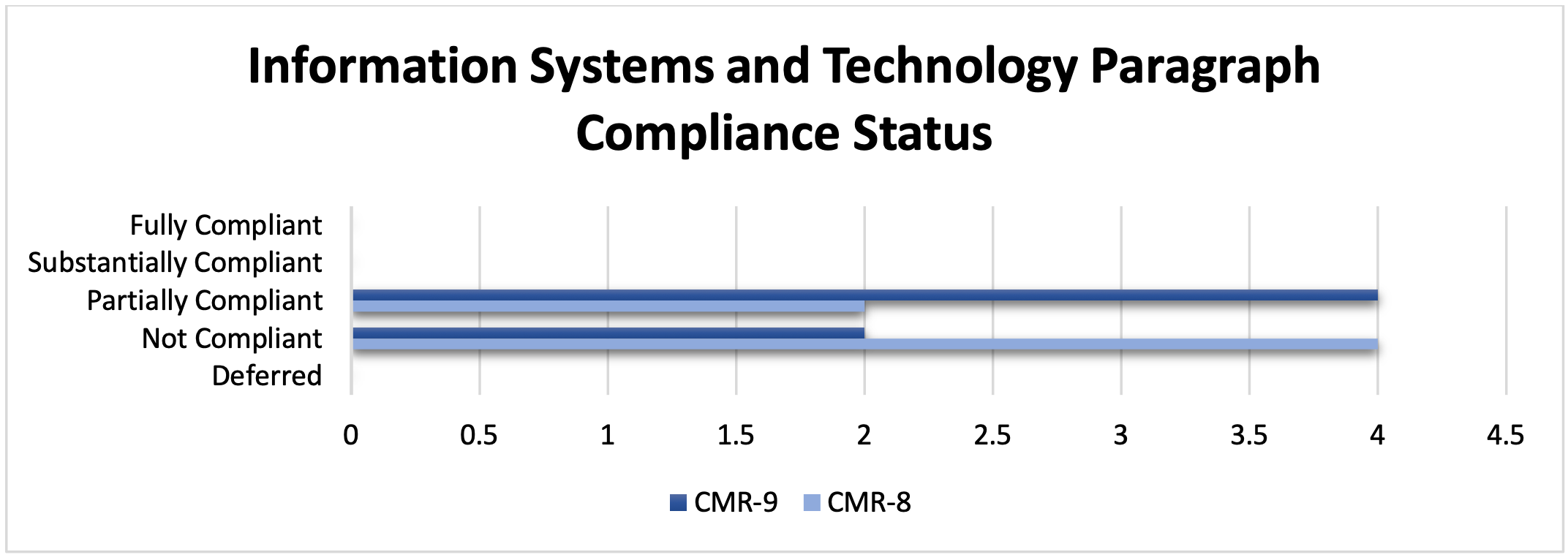
The online version of this
Executive Summary for the
Report is provided for convenience only.
The document filed in The United States District Court for the District of Puerto Rico is the definitive version:
Case 3:12-cv-02039-FAB Document 2541-1 Filed 12/14/23